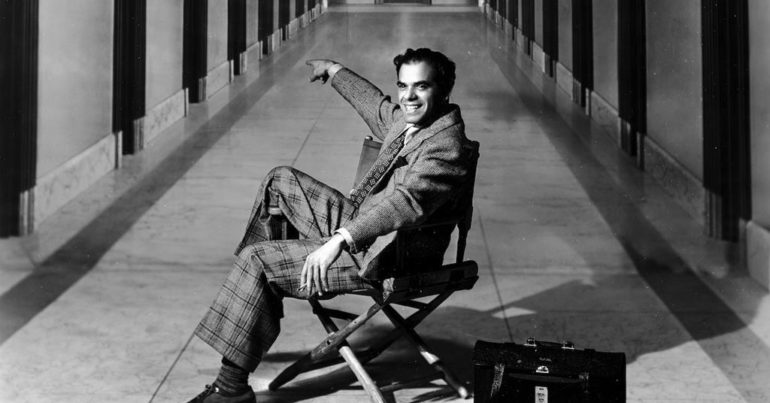Frank Capra (1897-1991) was unquestionably one of the great American directors. From an impoverished immigrant family, he rose to create some of the most beloved films in Hollywood history. The man behind It’s A Wonderful Life and It Happened One Night was driven to entertain the masses that might have felt his regrets, resents and need for hope. Matthew Wells’ new documentary Frank Capra: Mr. America offers some insight into why he felt a need to create these happy visions, but it does so in a matter-of-fact way that lacks the inspiration of its subject.
Capra’s life story is as interesting, and as quintessentially American, as his filmography. Moving from Sicily to California when Frank was just five years old, the Capras were poor, spoke no English, and depended on the work of all members (including the children) to get by. Yet, the intelligent, outspoken Frank was determined to do better. We learn of his time after college that saw him exploring California, and being held rapt by the ‘wonderful independence’ of the local populace, determined to claim their piece of the American Dream (In this context, it’s hard to shake the image of Capra being and enthusiastic yin to John Steinbeck’s critical yang). A perennial high achiever with a reader’s imagination, Capra strove to make his voice heard, and we can see his success in that endeavour to this day.
Capra’s is an incredible rags-to-riches tale, but we learn all this from the standard procession of talking heads that renders these kinds of documentaries forgettable by default. Historians, curators and admirers come and go with breathless admiration and fascinating tidbits about the man’s life and work. As we progress into Capra’s early endeavours in filmmaking, we hear from interviews with Capra himself. He learned about film the old-fashioned way: working in studio cutting rooms and editing footage. Segueing into directing shorts, he displayed a knack for creating visual comedy. The young Capra worked up through the Hollywood system, starting at the relatively low-rent Columbia Pictures, before exercising the power gifted to directors by hands-off studio head Harry Cohn. We see his experiments in various genres (Action, war, soap opera) before getting on to his big successes. Frank Capra: Mr. America plays out like an illustrated Wikipedia entry, hitting all the important points in chronological order.
It’s a pity Frank Capra: Mr. America is so beholden to its bog-standard format, because it does delve into darker parts of his story as it goes on. When experiencing racist prejudice as a teenager, Capra took on some of these resentments, which drove him to get away from the poverty his family experienced. In that sense, he arguably became more American than the Americans themselves, reflected in the overwhelming white-ness of his work (This was the 1930s-40s, after all). Reflections on his abilities to work with people who might differ from him politically are potent, but they don’t feel particularly revelatory in the framework of this film.
Capra saw the darkness that plagued Depression-era society, not least because some of that darkness resided in him. Seeing these facets of Capra be harnessed by the U.S. government to make the Why We Fight series of propaganda films makes those films more fascinating after the fact, but learning about the resent and bitterness that isolated him later in his career is less impactful when presented so blandly. Still, if Frank Capra: Mr. America does remind you how genuinely hot Platinum Blonde is, or makes you want to seek out Miracle Women or Forbidden (and you should, they’re great), then the film has done its job. It’s just done it in a predictable way.

